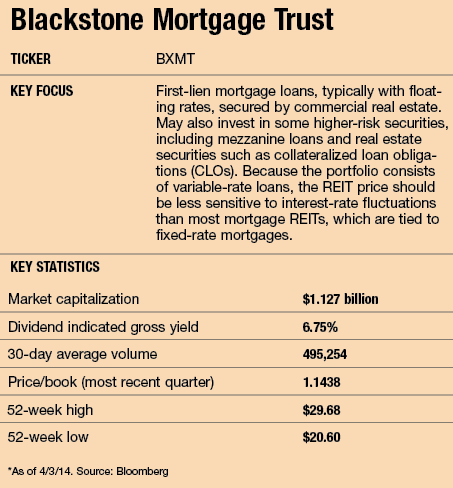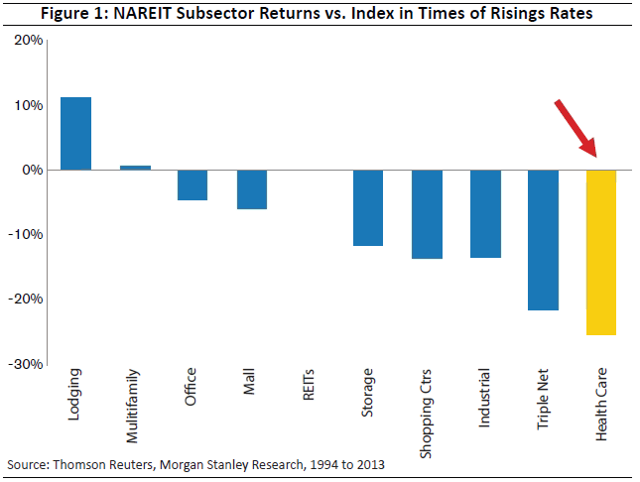A REIT For Rising Rates
Post on: 16 Июнь, 2015 No Comment

A REIT For Rising Rates
May 1, 2014 Marla Brill
Dividend yields north of 10% on many mortgage REITs are an enticing siren call for yield-hungry investors. But heeding that call can be fraught with peril.
Most mortgage REITs zero in on fixed-rate residential mortgages and mortgage-backed securities, and they do a lot of borrowing to execute their strategies. These characteristics make them highly sensitive to interest rate swings, and their volatility during times of fluctuating rates reflects that.
A handful of mortgage real estate investment trusts, however, focus on commercial properties. Because commercial loans often have variable rates, and the REITs leverage levels are usually tamer, they are often less vulnerable to changes in interest rates than REITs that focus on the residential mortgage space.
One investor, Blackstone Realty Trust (BXMT), has been aggressively building its book of variable-rate commercial property loans since last year, when a large public stock offering provided an injection of capital. Because our loans are floating rate, our loan portfolios dont change in value when fixed rates move, says Stephen Plavin, senior managing director of Blackstones Debt Strategies Group. And when interest rates rise, our dividends increase in lockstep. Those dividends fluctuate with changes in the variable loan rates of portfolio holdings, which are set at the London Interbank Offered Rate (LIBOR) plus a spread, usually 4% to 5%.
Blackstones global real estate group, which manages $79 billion in assets and is the largest real estate private equity firm in the world, has a long history of doing business with pension fund investors drawn to the firms decisive buy it, fix it, sell it approach. But Michael Nash, chief investment officer for Blackstone Real Estate Debt Strategies, makes it clear that the firm is also interested in attracting financial advisors through its mortgage REIT. He says that while the REITs shareholder base is mainly institutional, it might appeal to anyone who wants a high-yielding, high-quality investment that works well in a rising rate environment.
Nonetheless, dividend yields on Blackstone Mortgage Trust and other commercial mortgage REITs typically fall short of those generated by residential mortgage securities REITs. Recently, Blackstones dividend yield stood at 6.6%, according to Bloomberg, and yields for the commercial group in general have recently been in the 6% to 9% range. Thats well below the 14% yield for the iShares Mortgage REIT Capped ETF (REM).
But the commercial property group seems to hold the edge in terms of overall performance in a rising rate environment. Last spring and summer, residential mortgage REITs were hit particularly hard after the Federal Reserve announced plans to scale back its bond-buying program, which many considered a harbinger of rising rates. Those fears proved justified. By the end of June, the rate on a 30-year mortgage had jumped to 4.46%, up from 3.35% in early May.
The shock of higher rates reverberated through the bond world. Between May 15 and August 15, the iShares Mortgage REIT Capped ETF plunged nearly 20%. While commercial REITs felt a ripple effect, the impact was much more muted for most members of the group. Over the same time period, the Blackstone REITs shares fell about 8%.
Later in the year, residential REITs recovered some of the ground they lost during the summer as bargain hunters stepped in. Nonetheless, by year-end residential mortgage REITs such as Annaly Capital Management (NLY) and American Capital Agency (AGNC) had lost 18.30% and 20.28%, respectively, according to Morningstar. Blackstone Mortgage Trust ended the year up 32.6%.
While Blackstone competes with other commercial property REITs with a similar mission, such as Starwood Property Trust (STWD), Colony Financial (CLNY) and Resource Capital Corp. (RSO), Nash maintains Blackstones plain vanilla approach gives it an advantage over its peers. They do a wide array of things, including owning real estate, he says. We focus primarily on variable-rate first mortgage loans. Our simple business model is more predictable and less volatile.
At the heart of that business model are the 30 or so loans that make up the portfolio. They have a weighted average loan-to-value ratio of 65%, which means that property owners have significant equity stakes. They are backed by commercial properties such as offices and hotels and have relatively short terms of between three and five years. Although first-lien mortgage loans are its bread and butter, the trust can also invest in higher risk assets such as subordinate mortgage interests, mezzanine loans and real estate securities such as collateralized loan obligations.
Nash and Plavin consider a number of factors before they decide to offer mortgage money to property owners. We make sure borrowers have a lot of experience in owning and operating real estate, says Plavin. We analyze the business plan for a property and decide whether or not it is in a good position to compete in its geographic area. And the loan-to-value ratio should be comfortable, not pushed. All loans are secured by well-capitalized properties.
Over half of the portfolios loans are made for properties in major urban centers in New York and California, where the managers see broad-based economies and strong growth. We like to make loans against larger assets, and many of those are located in New York and California, explains Plavin.
The vast majority of properties are in the U.S. although the firm also has its sights set on London as the European economy slowly emerges from the recession. The firm closed its first international loan in the fourth quarter of 2013, which was tied to a London office building.
A Growing Role For Lenders

In the U.S. the shock of the commercial real estate downturn is wearing off slowly. We are in the middle of the cycle in the commercial real estate market, says Plavin. Things have been slowly recovering since mid-2009. Economic growth has improved demand and new supply remains constrained. The commercial real estate market in the U.S. is in a good place right now.
Commercial mortgage REITs like Blackstones, as well as other non-bank lenders, are playing an increasingly important role in the commercial lending world. As banks continue to digest the fallout from the real estate crash that happened just a few years ago, they arent eager to dive into many new commercial loans. At the same time, commercial property owners are eager to fund projects they believe will increase revenue and improve the value of their businesses.
Non-bank lenders are filling the gap. We provide interim financing for property owners to get from point A to point B, says Plavin. If the deal looks attractive, we can lend before a property is fully leased. A lot of banks demand recourse loans, which arent acceptable for many borrowers. We offer nonrecourse loans. And we can make decisions quickly. Borrowers also know they can rely on the depth and breadth of our experience and the speed and reliability of our execution.
In May 2013, the REIT increased its available capital dramatically when it raised over $634 million through a public equity offering. It quickly used the proceeds to write and acquire new loans. Plavin says the affiliation with Blackstone, the worlds largest private equity real estate firm, allows BXMT to benefit from existing professional relationships with property owners, real estate advisors and other key players.
The relationship also provides an early look at attractive deals. The portfolios biggest loan thus far, which closed in mid-2013, was a refinancing for a California group of office buildings. The REITs managers had learned of the deal through contacts at Blackstones private equity arm.
In a February report, Evercore Partners analyst Arren Cyganovich noted that the REITs close ties to Blackstone provides BXMT with ample deal flow, informational advantages and substantial relationships within the [commercial real estate] industry. We believe as BXMT continues to execute its strategy that it will garner a premium multiple toward the high end of its peers. Although the stock already trades at a premium to book value, he believes that its strong origination capability and benefits from its external advisor at Blackstone justify the markup.
However, the report also noted that the REITs loan portfolio is highly concentrated among certain borrowers and geographic areas. And while there is ample insulation from interest rate risk because of the variable rate loans, the firm is not immune to it.
While we view this [interest rate] risk as relatively low, BXMTs underlying property collateral on its loans could fall if borrowing costs rise too high with rising long-term interest rates, Cyganovich cautioned. Rising short-term interest rates could cause credit issues for tenants as the cost of funds increases based upon a benchmark rate.
Still, Plavin believes that in the universe of yield-generating investments Blackstone Mortgage Trust is among the best prepared to meet the challenges presented by upward marching interest rates. Rising rates will not be kind to fixed-rate investments, he says. For our REIT investors, they will be good news.














